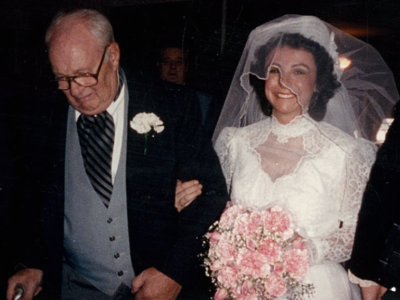This post describes, in part, the effects of a degenerative neurological condition called Huntington’s Disease. Any negative behavior on the part of my wife should be attributed to that condition. Any negative behavior on the part of myself should be attributed to my need for God’s ongoing grace.
If you would like to read our story from the beginning, you can start here: How We Got Here…
This week I’m continued to work downstairs so I could be near Janet. Things are going well except that Janet has an open sore on her bum. The nurse said it’s not a bed sore and they have given us some cream to put on it that is supposed to help it heal.
The other night, Janet called me and told me that she needed help getting into bed, and turning off the TV. She also had a tablespoon that she needed me to put in the dishwasher. Not a problem except that:
- She was already in bed.
- The TV was off and the room was dark.
- There was no spoon.
She may have been dreaming, or this may be something new – only time will tell. Perhaps it is related to something else that I have noticed: some time ago, Janet started losing track of what day it was. She has just started having trouble distinguishing day from night. The other afternoon I was finishing up my work for the day and Janet asked me what time it was. When I told her that it was 5 o’clock, she looked at me strangely and asked me what was the matter, couldn’t I sleep? Although I had been sitting next to her all day working, she thought it was 5 in the morning.
This week, I spoke with a family member of Janet’s who related all the people who (decades ago) might have had HD but were either diagnosed with something else, or simply passed off as unpleasant people that you didn’t contact unless you absolutely, positively had to. She spoke passionately about how bizarre it is that people have this disease in their family and they don’t want to talk about it. I had to tell her that I didn’t understand it either.
For me, the whole conversation really drove home two points: First, if we are open to the change, we can derive from our caregiving experiences a perspective that fundamentally alters the ways in which we interact with others. Maybe that guy who cut you off in traffic wasn’t a “jerk.” Maybe he is carrying around a pain that he can’t begin to express and you can’t begin to imagine. Second, what a blessing it is to have a definitive test for HD! As hard as it has been dealing with this disease, I can’t imagine going through this and not being sure what it is that we are fighting – but until 1993 that was exactly the situation we were in.
Bottom line is that I believe we owe a tremendous debt not only to the doctors, but also to those families in Venezuela who suffered in silence from the disease and the associated social stigma for generations. In the end, the thing that made the discovery of HD’s genetic markers possible was the unique circumstance that everyone in the region around Lake Maracaibo that had HD all shared one common ancestor from the 1800’s – who, by the way, has today an estimated 20,000 descendants who are at risk.
Thanks to Dr Huntington, we have a description of the disease and a name. Thanks to the people around Lake Maracaibo, Venezuela, we know what causes the disease that Dr Huntington identified. Thanks to the ongoing research in many countries, the cause identified in Venezuela has led to the testing of several potential treatments – a couple of which are showing great promise. The fact is, all these points in time are nodes on a golden thread that someday will end, not with just treatments for this disease, but with its eradication. Someday, someone will say, “I am the world’s first HD survivor.” and then in an even more distant time, “I was the last case of HD on earth…”
Consequently, no node along that thread is more important than another because if you take any one of them away, the thread breaks and we are left in a world of pain, superstition and uncertainty. So while the future may still be murky, we at least know what we are up against – and that’s not nuthin’.
❦ ❦ ❦ ❦ ❦ ❦
This week we are going to consider one of the common questions in the support forums – whether it is explicitly stated or not. This question appears in post after post written by caregivers who are at the ends of their figurative ropes. While the words of these messages might take the form of “rants,” the subtext lying just below the surface is often a very simple question:
How do I know when I’m in over my head?
Which, let’s be honest, is just a gentler of the way of asking the question that everyone is afraid to ask, and the “professionals” are apparently afraid to answer:
Is it time for my loved one to go to a nursing home?
I know that during the time that I have been caring for Janet, I have asked that question repeatedly of doctors, social workers and counselors. Unfortunately, the closest I ever got to an answer was,
“I don’t know, but families typically wait too long…”
So I did what people do these days to learn things: I tried looking online. However, even there I found little useful information because everyone seems more interested in telling me where to put Janet, than in telling me how to determine if she even needed to be in one.
What I have found is that a large part of the upset that people feel about putting someone in a care facility can be self-induced, because the caregiver failed to evaluate three big questions:
1. What is your loved one’s current situation?
This is a big one and potentially confusing, as well. The point here is you need to know and understand, as dispassionately as possible, your loved one’s strengths and weaknesses. However, while your opinions may play a role, in and of themselves, they aren’t enough. Your loved one’s abilities need to be measured, and that is where ADLs come in to play. The acronym stands for Activities of Daily Living, which is a term used in healthcare to refer to people’s daily self-care activities.
Common ADLs include the ability to feed oneself, bathing, dressing, grooming, work, homemaking, and toileting – all pretty basic stuff. Another ADL that requires a bit of explanation is functional mobility, often referred to as “transferring,” it is a measure of the person’s ability to walk, and to get in and out of a bed or chair. Don’t be anxious to rush past this one. Too many caregiving experiences come to a tragic, premature end as the result of a fall and a broken bone.
Now the tricky part of this sort of evaluation is that these measures are not simply black or white. Rather, the evaluation is all about analyzing the shades of gray! However, over the years, the medical profession has developed a number of tools for formally assessing your loved one. Common ones include the Katz ADL scale, the Older Americans Resources and Services (OARS) ADL/IADL scale, the Lawton IADL scale and the Bristol Activities of Daily Living Scale.
Normally, these evaluations are performed by trained personnel one-on-one with the patient, but you may be invited to assist in the evaluation – especially if your loved one has trouble with verbal communications. But if you are so called upon, remember that unless you are specifically addressed, your job is to help them communicate what they want to say. Of course, if they say something that is unequivocally false, by all means point it out, but don’t put words in their mouths.
Also think about current living conditions. Are they at home alone or are they living with you or another caregiver – such as an equally infirm spouse? Are they open to change? What sorts of changes will they likely accept? My mother, for instance, was absolutely insistent that she never become, “… a burden to my children.”
2. What is best for your loved one?
Clearly, this is a complicated question. The complication arises because the clause, “What is best…” implies a concern for their needs, but which needs? There are many categories that we could insert here, but to get a just a taste of what we are confronting, consider for a moment how overloaded a term the word “health” is. Everyone wants to be “healthy,” but nobody has a definitive meaning for the word or even a complete list of all the possible subcategories (mental health, physical health, spiritual health, financial health, etc.).
Next, what happens when the needs raised by one category are in conflict with the needs of another category? For example, in a mad rush to save peoples’ physical lives from a virus, we sometimes find ourselves killing them emotionally and spiritually. At one point, not long ago, the word “holistic” was being bandied about frequently in terms of healthcare, but no longer. Only the truly brave should take the time to contemplate what that fact says about us as a people.
Finally, in addition to needing to do a lot better job at prioritizing a person’s needs, we also need to think about interpersonal needs – such as when one or more of their needs is in conflict with a need of ours.
After my mother had her last stroke, she was left without the ability to speak, but made it clear that she didn’t want additional care: she didn’t want food or water, it was time for her to go. My son was visiting with us at the time and he participated in the conversation with the doctor where the decision was made to move her into hospice. At the end of the conversation, I asked him how he felt, and he gave a raw, honest answer. He simply said, “Selfish.”
Her need was to go on to what was next for her. His need was to not lose his grandma.
And unfortunately, that is where I’m going to have to leave this question. I don’t have any answers to give. But maybe that is the point. Maybe this question is one for which there is no “final” answer. Maybe this is a question that you must hold open and wrestle with every day.
3. What resources do you have at your disposal?
When people typically use the word “resources” today, it is most commonly used as a euphemism for “money,” and while the financial resources you have at your disposal are important, they are by no means the only resource of importance. As unhappy as this fact makes certain types of people, there are problems that can’t be fixed by “throwing money at them.” Still, there are things that money can buy to help keep a loved one out of a nursing home. For example, I have commented in the past about the interior security cameras that I installed to help me keep an eye on Janet – they weren’t inexpensive, but compared to a nursing home, they were a bargain.
My recommendation is to be systematic in analyzing all the resources that you have at your disposal. For example, you may have significant familial resources. Our situation is a good example of that. I don’t know if Frannie understands the positive contribution that she has made to her mother’s life, but she is amazing. Our son has also provided comfort and support, and an unending string of milestones that motivated Janet to keep going: graduation from college, military commissioning, marriage, children, and most recently his promotion to Major. In a broader context, even my children from my previous marriages have been there for her with prayers and advice.
In the same way, take some time to analyze the social, religious, governmental resources.
In terms of social networks, I have heard that there is no easier way to identify who your real friends are than to simply start honestly answering the question, “How are you doing?” But candid answers to that question can do more than simply weed out the smiling faces that really aren’t interested, they can also serve to attract people to you that are interested and concerned.
In this drive towards emotional honesty, don’t leave out honest conversations with your pastor, minister, priest, or rabbi. Likewise, if your loved one belongs to a different church (or faith) contact their clergy, as well. And be diligent to educate yourself about spiritual practices that might be supportive to them. For example, if your loved one attends a liturgical church (basically Catholic, Orthodox, Lutheran or Episcopalian) they may draw strength from Eucharistic visits by a member of the clergy, or a specially commissioned lay person called a Eucharistic Minister. Such visits are a time for conversation and prayer, but also an opportunity to receive Communion or the Eucharist. Last week I talked about how much such a visit meant to Janet. Just let them know ahead of time if there are any dietary restrictions – like no alcohol or gluten intolerance.
Finally, in terms of government (or quasi-governmental) support, many jurisdictions are trying to make it easier to get help. For example, in Texas, calling 211 puts you in contact with either an automated system or a human counselor that will help you identify your needs and the resources that might be available to meet those needs.
While you consider those questions (and others that you may discover on your own), I want to again point out how fast situations can change. For example, your loved one might be fine one day and but thanks to an injury or an acute medical condition that suddenly arises, they might need a short-notice placement in a nursing home or long-term care facility.
The thing to do is plan for contingencies. Be looking at places before you need them, and have your options narrowed down to a short list of two or three places that you would be happy with if a critical need should suddenly arise. Also be thinking about potential legal issues, and remember that elder law is a specialty (in the US at least) so have in your “back pocket” the name or names of lawyers in your area that have good reputations and are skilled in this aspect of the law, should the need arise.
Above all, make sure you have a medical POA (Power of Attorney) in place. This critical document must be executed while your loved one is still mentally competent to make decisions. Don’t forget to sort out their desires for end-of-life care.
In the US (and other places as well) there are also volunteer ombudsman programs that can help you navigate the often choppy waters of getting help for your loved one. Another good source is this website. Although it is managed by (of all things) an internet marketing firm located in British Columbia, it presents solid information and has no obvious “axes to grind” that I noticed.
Finally, remember that if you decide that the best thing for your loved one is to move to a long-term care facility of some kind, that placement changes your responsibilities as a caregiver – it doesn’t obviate them. For example, an unfortunate fact is that elder abuse is real and is unfortunately growing due to the lack of oversight due to such things as Covid-19 mitigation measures. At all times, as their advocate, you will need to be a bulldog: a polite, convivial, friendly, firm and (when necessary) courageous – bulldog.
In Christ, Amen ☩
❦ ❦ ❦ ❦ ❦ ❦
A prayer for when you need wisdom and insight…
“Blessed are You, Lord God, King of the Universe. It is right that I should at all times and in all circumstances bless You for Your all-knowing presence. But today I want to bless you especially for the promise to give knowledge to those who earnestly seek it. I need your wisdom and discernment, please. Amen.”






